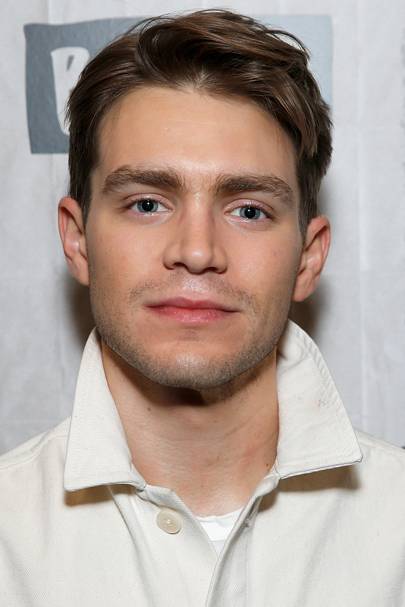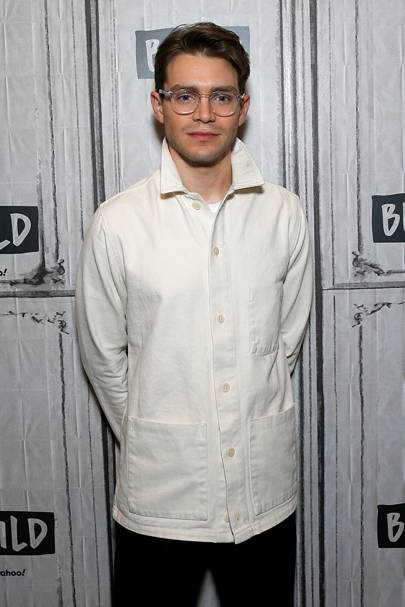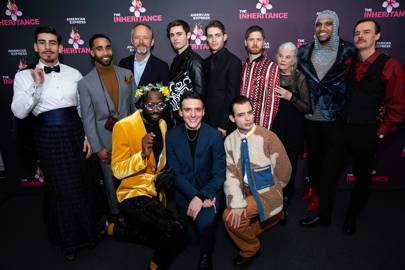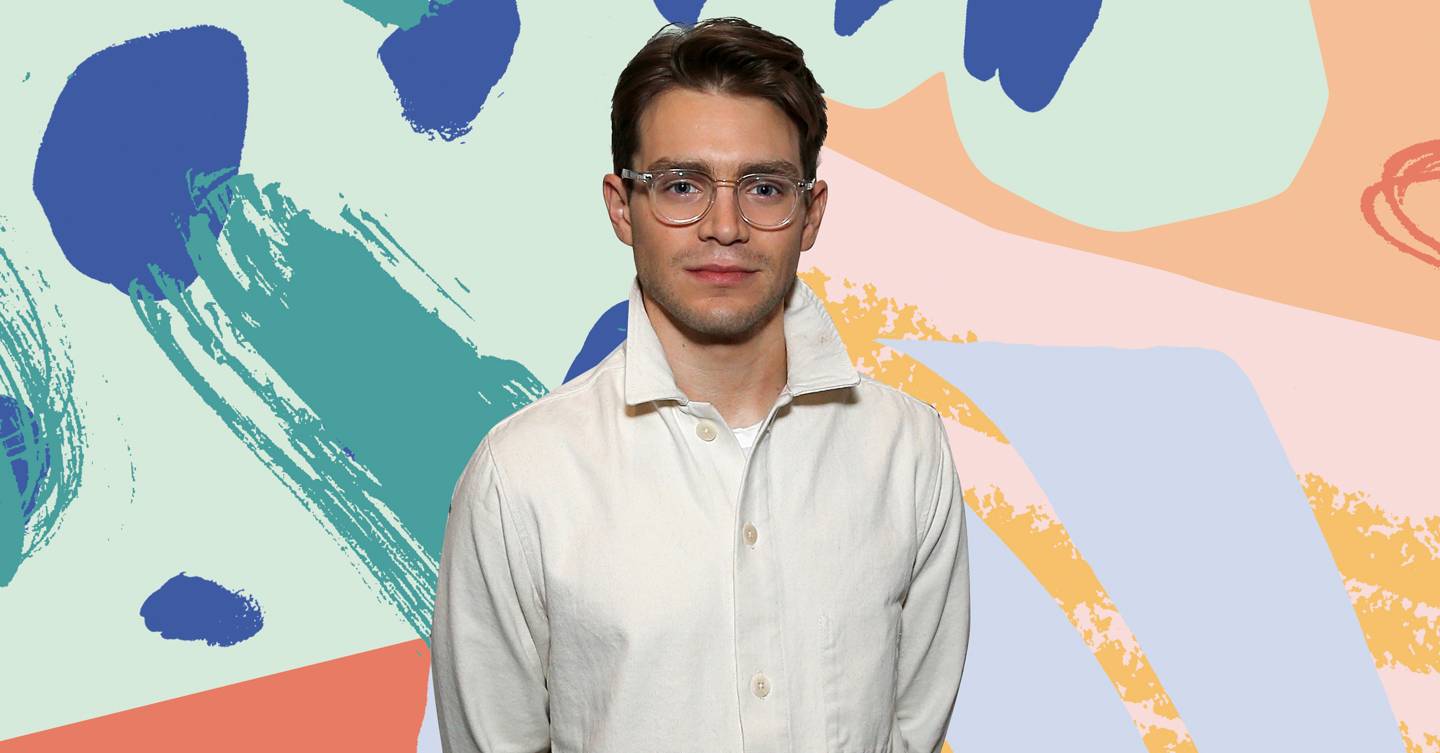The Inheritance has caused a storm in the theatre world on both sides of the Atlantic and whilst it’s garnered four Oliver Awards in the process, the real reward has been for the impactful effect on its audiences, as well as the change it has conjured in the play’s actors.
Created by Matthew Lopez, The Inheritance is a heartbreaking cross generational look at HIV and Aids, following Eric and Toby, a 30-something contemporary couple who, on the verge of their engagement, come into contact with an older man who is haunted by his past at the same time they encounter a young man hungry for the future.

Getty Images
This three-generational approach to HIV is groundbreaking and the beating heart of the play’s success is the sheer talent of its stars, namely Andrew Burnap who plays the troubled Toby Darling.
The role has been the making of Andrew’s career but also his personal self as here, he opens up about navigating sexuality, masculinity and coming to terms with his own personal ‘truth’…
The Inheritance runs across two parts both over 3 hours long and you do that 5 times a week! How are you finding it?
We have Mondays and Tuesdays off. So, Monday is usually just a fog, and then Tuesday I feel, like I got hit by a bus! It’s crazy. There is never a dull moment. It’s both the most profoundly rewarding thing I’ve ever done in my life, one of the most challenging and also the most insane. It’s sort of beyond articulation, in a way. It encompasses everything, I think is the easiest way to put it.
What do you think you’ve learned about yourself through playing this character the most?
Oh, man! I mean, on a serious note, it’s opened me up to my rather fluid sexuality. I think it’s really given me permission to understand a side of myself that I haven’t given voice to or stepped fully into in my life before this play, which is a really beautiful thing. Then also I’ve just learned how to deal with stress, how to deal with exhaustion, how to deal with letting people have their own opinions about what the play and (my character) Toby Darling and letting that be and not being personally attacked by that. And also, not let it stroke my ego to the point where I think I’m the next best thing. It’s letting people have their opinions of it and letting that pass through me. Our brains are association machines, and everyone has their own associations and the biggest lesson is leaving everyone to have their space, I would say.
What was your relationship with sexuality like before the play and now?
I very much, before this play, identified as a straight man. I think I’ve benefited from the privilege of being assumed as straight my entire life, but I don’t identify that way. It’s been interesting to have people assume that I am that, and that’s been difficult for me because I am in a place in my life where I feel like I’m in a space of expansion and stepping into the full version of myself, and certainly through my own sexuality. I’m sort of falling into the category of curiosity, questioning and trying to understand my full self, and that’s a really vulnerable, scary but also beautiful place to be.
Are you learning that there is a lot of power in your own vulnerability?
Oh, 100%. Even in the subject matter of the play, Toby’s inability to be vulnerable is the flaw that ultimately is his demise, I think. His inability to look at the things that have traumatised him in his life and his refusal to turn those into strengths, to turn those into positives, are the thing that is most heartbreaking for me. So, it’s taught me to take negative experiences and to use those as superpowers.

Getty Images
How have you found the stamina to do this physical and emotionally draining play – how have you worked on your own wellness?
It’s a constant negotiation. I want to feel like my life is so much larger than just doing this play, and there are some days off where I need to just lay in bed and watch movies. That’s all I can do on some days. Above all, I have learned to listen to my body, to my spirit and to understand what it needs in that present moment, and it’s not always going to be the same. The sort of fire in my engine is the experience of listening to people’s personal accounts at the stage door. For two years, now specifically for older gay men who’ve seen this, talk to us, tell us their stories and tell us about the men that they’ve lost, the men that they remembered that night, the people who were brought back to them, the memories that were brought back to them, the movement that they felt from a stuck place is the very thing that keeps this worth doing. I witnessed seemingly two strangers in the audience hug each other at the end of the play was one of the most profoundly moving things I’ve ever seen. They entered into that theatre strangers and that now are our friends and share emails. It becomes a full time job, staving off tears at the stage door, because people – and talking about the power of vulnerability – people revealed themselves to us in such a brave and courageous way that I hope that never ends.
Well, is there a story that someone’s told you at the stage door that stayed with you the most?
It was at a bar across the street from the theatre straight after the show. A woman was sitting at the bar with her husband and she reached over, and she said, “Thank you so much for the show. My brother died of HIV 10 days after he was diagnosed,” and she showed me his picture. She sent me his picture and we have a little mural up on the wall backstage of all these pictures of men that were lost during that time. I put his picture up and a little bio about him and sort of carried his image with me through the show for that week and that just infused this whole new life into it for me, and I will never forget her courageousness in saying to me, “Hey, I want to let you know that I have a personal connection to this story that you just told, and here it is, and here’s my phone number, and here’s my brother’s story.” I just find that so beautiful and that one has stuck with me for a long time.
I talk a lot about the power of sisterhood in interviews but what has this male heavy production which proposes a different and unique approach to masculinity taught you about the power of brotherhood?
I think you get, in my mind, culturally and societally you get this “macho-ness feeling,” of, “We go to the gym together. We talk about whatever masculine things are!” But to me, the power of brotherhood is in the word that you used, which is vulnerability. Seeing, understanding that there’s a beautiful power in softness and vulnerability, specifically in men I think is something that we have to hold onto. We have to teach the younger men that you don’t have to be any idea of what a man means. I feel like there’s this handed down thing of John Wayne, a stiff upper lip, no crying, no showing emotion, providing for people and I think is sort of detrimental to true brotherhood. I think it always comes down to the power of vulnerability and knowing that every human being and every man suffers, and we have to be able to talk about it.

Shutterstock
How has your relationship with masculinity changed, especially in the last two years of being in The Inheritance, would you say?
I think it started changing for me in grad school. I think once I really got serious about trying to understand human beings and the choices that they make and why they make those choices, I started to find real meaning, and meaning in that word I keep using, vulnerability – it’s such a great f**king word! In grad school, for the first time I was around men, specifically actors and my teachers at the time, who understood that some ideas of masculinity are a false construct. We were encouraged to transcend that false construct in order to fully understand ourselves and fully understand the characters that we were playing. It all happened around the age of 22 years old.
Would you say playing the character of Toby Darling has been one of the most therapeutic experiences of your life?
100%, but not only because of the subject matter of the play itself, but also the people that I’ve worked with. That trust amongst people is rare, and to know and feel like you can fail in front of these people and have them not judge you, to look foolish and stupid in front of these people as you create this thing is so valuable. Translating that into life has been a real gift, to know that you can fail and have people around you that will still love you no matter what.
In turn what have you learnt about your relationship with your own body image?
As a kid, I was a super-duper skinny. I was always bullied for being really, really skinny as a kid, and I was obsessed with getting muscular, obsessed with getting jacked because I thought that’s what a real man was. Having a physical stature, having a physical presence in my mind was the key to happiness. If only my biceps were only that much bigger, I would be happier, I thought. I’ve never struggled with the opposite end of the spectrum; I’ve never struggled with my weight in terms of feeling like I was judged for being overweight or having a body that was not societally acceptable. I have changed my relationship to the fact that, “Oh, actually, it’s the inner man that is much more important than what the outer man looks like,” and the people who would judge me for looking a certain way are actually people that I don’t want in my life.
The people who judge me for the decisions that I make and for the way I treat human beings are the people that I want in my life. So, I think my relationship to my body and body image will be a constant negotiation. There are times still where I struggle with it and think back to that little kid who just was drinking malted milkshakes in order to gain weight, but I certainly have learned that thinking about what I can do on the inside is far more important than what my outside looks like.
It’s so funny how often we waste our youth on worrying about how beautiful we are and then all of a sudden I feel like one wakes up one day and thinks, “I wasted all that time. I wasted all that time thinking about the wrong things.” I often try to think about what I would think when I’m 55? What would I think about when I’m 60? What will I regret when I’m 60, that I didn’t do, that I didn’t think about, and then I try to do that thing now whilst I still have time.
It’s a deep question but what do you think or what do you want the lasting lesson from your performance to be?
It is, but I’ve been thinking about this a lot actually, of late, because I hope in my own journey of emotional intelligence. I came across this quote that I think is very true about Toby’s journey as well and that we all have a duty as responsible humans on this earth to heal ourselves from our trauma. That is much easier said than done, specifically for those who, like Toby, went through horrible childhood trauma, but healing we in order to be better humans is I think the ultimate mission. I hope people see Toby’s inability to do so as a sort of warning call and his inability to face the truth and heal from the truth was ultimately his downfall, and I hope people see that and understand, “I actually have more work to do on myself than I thought.”
Is that ultimately what you’ve learned to own your own truth?
Yes, 100%. there are facets of me, there are things about me that I have to do more work to heal in order to be a more emotionally intelligent, better, well rounded human, but also for the people that I love in my life, to be able to hold space for them, to be able to treat them with the love and respect that they deserve. I think it’s imperative.
Is there something in particular that you worked on in that sense – is it the ideal of sexuality?
Yeah, I think it’s also my own relationship to truth. I think relationship to my truth and not being afraid to speak my truth and to live my truth in a world that so often wants you to be smaller and smaller and smaller, to take up less space and less space and less space. I think being ruthlessly honest with yourself is one of the hardest things you can do. It’s so hard, but it is the key to open all the doors that you never thought could be opened.
